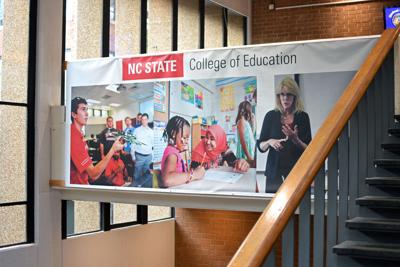This is the third article in a series highlighting a researcher from each college at NC State.
“Children should learn that reading is pleasure, not just something that teachers make you do in school.” This quote from renowned author Beverly Cleary exemplifies the core values of Wolfpack WORKS (Ways to Optimize Reading/Writing for Kids Statewide), an early childhood literacy project based at NC State.
Kaelyn Oakes, a fourth-year studying elementary education, works as an undergraduate research assistant with Wolfpack WORKS. Wolfpack WORKS supports K-12 teachers in North Carolina, some of whom are NC State alumni.
“Basically, it was a program that was meant to support beginning K-12 teachers in high need districts in North Carolina,” Oakes said. According to the website for Wolfpack WORKS, they target districts where there is high teacher turnover and increased demand for teachers.
“There was a bigger research project and initiative going on within Wolfpack WORKS,” Oakes said. “But our advisor asked us [undergraduate researchers] if we wanted to take the information that we were given and do our own project.”
In partnership with the North Carolina Department of Public Instruction (NCDPI), Wolfpack WORKS introduces evidence-based teaching practices into classrooms. Today, the program involves 15 school districts and has benefited 200+ beginning teachers.
Oakes’s experience with the program, which occurred last year, delved into the effect of remote learning on children. In particular, Oakes and Wolfpack WORKS studied how the pandemic changed literacy instruction.
“A lot of undergraduate programs do not prepare beginning teachers to come in and efficiently lead kids in literacy instruction,” Oakes said.
Wolfpack WORKS aims to reduce the number of interventions needed throughout a child’s literacy journey from kindergarten to 12th grade.
In most classrooms, group read-aloud is a regular occurrence. However, the transition to digital learning during the pandemic significantly impacted the traditional classroom structure, including read-alouds. Oakes’s research focused specifically on how these changes affected early childhood education and literacy outcomes.
“This is a big problem because in those developmental years, if kids don’t have the foundational skills after second grade, they are labeled ‘behind,’” Oakes said. “There’s a lot riding on literacy.”
The idea of Wolfpack WORKS is to provide teachers with the tools needed to ensure a strong literacy foundation for students and to avoid those adverse consequences. Wolfpack WORKS targets beginning teachers simply because that cohort might need additional support.
Oakes learned of Wolfpack WORKS from a college of education email that advertised the program to undergraduate students. For her position, Oakes followed a “make your own schedule” approach.
“We had kind of set hours,” Oakes said. “They said, ‘You have the ability to work as much as you want’ within the constraints of whatever they had for us to do.”
On a typical day, Oakes led 45-minute interviews with teacher participants in the program. She administered yearly interviews with the teachers before coding the resulting qualitative data.
“Zoom was our friend,” Oakes said. “We did a lot of video-calls. We also had to code interviews after through Google Sheets.”
According to Oakes, she and other undergraduate assistants were able to collaborate with other educators when they presented their findings at the NCSU Undergraduate Symposium.
“In that way, we were sharing it [data] with other departments,” Oakes said. “It was an opportunity for us to present to other fields and for us to go around and see what other undergraduates were doing.”
Oakes’ study yielded real world results.
“Essentially, we found that teachers were continuing to incorporate live read-alouds into their instruction,” Oakes said. “We were worried that through the pandemic, that might have been lost on teachers, but it was still being done — which is really great to see.”
Hopefully, Oakes’ efforts and those of her colleagues will encourage new teachers across North Carolina to develop instructional strategies that inspire children to find pleasure in reading.




(0) comments
Welcome to the discussion.
Log In
Keep it Clean. Please avoid obscene, vulgar, lewd, racist or sexually-oriented language.
PLEASE TURN OFF YOUR CAPS LOCK.
Don't Threaten. Threats of harming another person will not be tolerated.
Be Truthful. Don't knowingly lie about anyone or anything.
Be Nice. No racism, sexism or any sort of -ism that is degrading to another person.
Be Proactive. Use the 'Report' link on each comment to let us know of abusive posts.
Share with Us. We'd love to hear eyewitness accounts, the history behind an article.